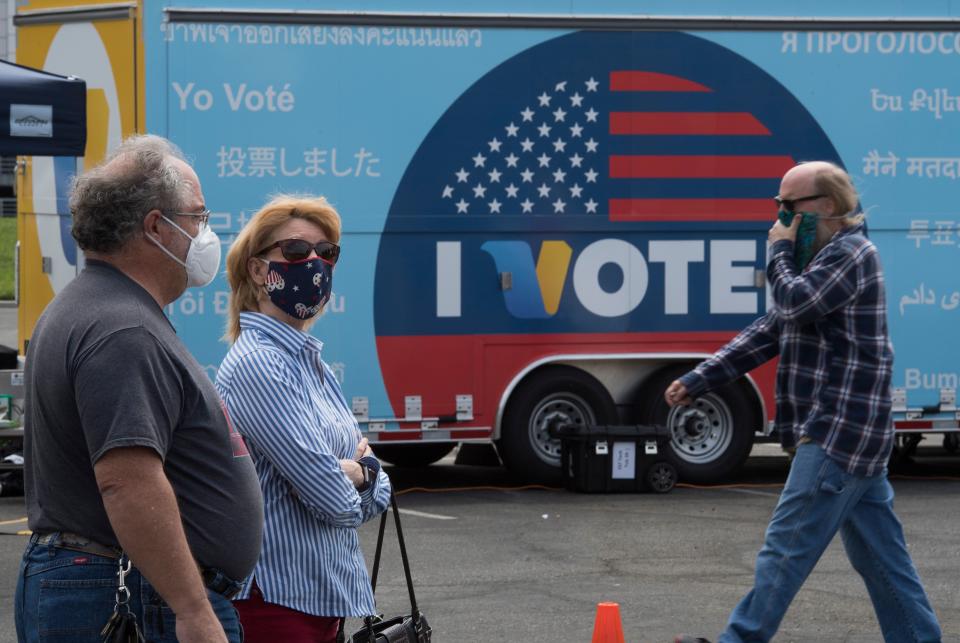Coronavirus has made the 2020 election a perfect storm for voting rights lawsuits
WASHINGTON — The 2020 election is setting up a legal battle of historic proportions over voting rights, said the top Democratic attorney in the thick of the fight.
“There’s been more voting rights litigation this election cycle already than there was in all of 2016, by a lot,” said Marc Elias, a D.C.-based lawyer with a long history in the political trenches.
“There may be more voting rights litigation in 2020 already than there was in 2016 and 2012 combined. It is on an order of magnitude,” Elias said in an interview on “The Long Game,” a Yahoo News podcast. And the situation is being exacerbated by the coronavirus outbreak, which could require an unprecedented increase in mail-in voting this November.
Elias, who was the top campaign lawyer for Hillary Clinton’s 2016 presidential campaign, said he currently has 32 active lawsuits in 16 states, with about three-quarters of those suits having been filed since last November.
Republicans are not sitting idly by either. The Trump campaign and the Republican National Committee have budgeted $20 million for court fights over voting rights.
“Marc Elias isn’t some knight fighting for voting rights. He’s trying to maximize Democrat votes, and that means opening up our elections to opportunities for fraud,” Tim Murtaugh, a spokesman for President Trump’s reelection campaign, told Yahoo News.
Trump talks often about voter fraud, despite the lack of documented evidence of significant voter fraud in modern elections.
“Fraud by voters at the polls is vanishingly rare and does not happen on a scale even close to that necessary to ‘rig’ an election,” according to the Brennan Center for Justice, a nonpartisan voting rights group at New York University.
Elias said a massive legal brawl in 2020 has been brewing for several years thanks to three factors.
First, the 2013 Supreme Court decision in Shelby vs. Holder found that states no longer needed to seek Justice Department approval for major changes to voting procedures. The 1965 Voting Rights Act had instituted “pre-clearance” for a number of Southern states with a history of race-based voting discrimination.

But Chief Justice John Roberts wrote in the 5-4 majority opinion in Shelby that pre-clearance was based on outdated criteria, and that if Congress wanted to reinstitute it, lawmakers “must identify those jurisdictions to be singled out on a basis that makes sense in light of current conditions.”
The Shelby decision, Elias said, “sent a broader cultural signal to Republican legislatures to pass more restrictive voting rules.” That development was a big reason why 2020 was already full of legal battles over voting laws before the coronavirus emerged.
After Democrats took control of the House in the 2018 election, they spent much of 2019 holding hearings in a special committee to establish a record of “current conditions” that they said constituted modern-day voter suppression, usually in states controlled by Republicans, and against minority voters who tend to overwhelmingly support Democrats.
Second, in 2018, restrictions were lifted that had for 35 years prevented the RNC from implementing “ballot security” measures. Questionable tactics by the RNC toward minority voters sustained the limitations for many years, but a federal judge allowed them to expire. Now the RNC has said it plans to recruit up to 50,000 volunteers to look for voters they deem to be suspicious at polling places in the fall elections, and to challenge ballots if need be.
Third, Elias said that Trump’s rhetoric has made Republicans “much more comfortable being in a position of opposing voting rights.”
Coronavirus, Elias said, is “adding gasoline on top of a fire.”
Many of his lawsuits filed this year are aimed at voting by mail, which is expected to see a huge jump this fall as voters try to avoid standing in long lines and being exposed to the virus.
Trump and the GOP are opposing the push to expand vote-by-mail because they say it increases the chances of cheating. Trump has called mail-in voting “corrupt” and said that expanding it would mean “you’d never have a Republican elected in this country again.”
“Let’s not confuse absentee voting, when voters cannot make it to the polls on Election Day, with all-mail voting,” Murtaugh told Yahoo News. “If you mail a ballot to every registered voter, there’s no way of knowing if each voter still lives at the same address, still lives in the same state or is even still alive.”
Elias has four key provisions in most of his lawsuits, which he says are necessary to make sure anyone who wants to vote by mail in states that allow it can do so.
First, Elias is pushing for states to send mail-in ballots with prepaid postage, removing a barrier to returning the ballot.
Second, he wants ballots to be counted as long as they are postmarked by Election Day. That would mean that votes would be counted for several days after Election Day, delaying the final result. That’s already likely to happen in key states like Wisconsin and Pennsylvania anyway, but it’s a major change for Americans who are used to finding out who the next president will be on the night of the election.
Third, Elias and Democrats want to make sure that states with signature-matching requirements have proper training for their election workers. Signature matching is used in many states to compare a voter’s signature on file with the one on their ballot to prevent fraud. In states that have been conducting their elections entirely by mail for years — like Colorado, Washington, Oregon, Utah and Hawaii — officials are trained in how to properly assess signatures and on the proper and improper reasons for rejecting ballots based on signature issues.

Fourth, and most controversially, the lawsuits brought by Elias are pushing for “community organizations” to be allowed to “help collect and deliver voted, sealed ballots.”
This is known by its critics as “ballot harvesting.” Republicans in particular are incensed about its widespread use in California, where they blamed losses in several close congressional races in 2018 on Democrats’ use of ballot collection and implied — without evidence — that the practice was abused.
But in North Carolina in 2018, a political operative working for a Republican candidate for Congress allegedly obtained scores of mail-in ballots and tampered with them to help his candidate.
Elias worked on behalf of the Democratic candidate in that election, Dan McReady, and is intimately familiar with the facts of that case.
In North Carolina, ballot collection or “ballot harvesting” is not allowed in the first place. Only a “near relative (spouse, brother, sister, parent, grandparent, child, grandchild, mother-in-law, father-in-law, daughter-in-law, son-in-law, stepparent, stepchild or qualified legal guardian)” may deliver a ballot for someone else.
In California, the law was changed in 2016 to allow anyone to collect unlimited ballots and turn them in.
The Los Angeles Times editorialized that the law was “overly permissive” and did “open the door to coercion and fraud and should be fixed or repealed before the next election.”
Murtaugh, the Trump campaign spokesman, echoed this argument. “Vote harvesting is also ripe for mischief because there’s no control over the people collecting the ballots or over whether they favor one party over another. There’s no secure chain of custody of the ballots,” he said. “Everyone wants to expand access to voting, which is why Republicans enthusiastically register new voters each election cycle, but we should not sacrifice election security.”
But Elias pushed back on this. “You’re assuming that voters are going to relinquish their ballot to someone who they don’t know or to an organization they don’t trust,” Elias said. “They’re going to give it to them because they trust that organization to get the ballot delivered.
“The communities that rely most on ballot collection are the communities that have the least reliable mail service. And that’s the bottom-line truth of all this,” Elias said.
If Republicans wanted to provide an alternative to ballot collection, Elias argued, they could push for more secure drop boxes that are overseen by election officials, which would provide lower-income voters with limited time and resources greater access to the ballot box.
“They’re nowhere on that. They just want to make it harder for people to vote who they think are not going to support their candidates,” he said.
_____
Click here for the latest coronavirus news and updates. According to experts, people over 60 and those who are immunocompromised continue to be the most at risk. If you have questions, please refer to the CDC’s and WHO’s resource guides.
Read more:
Obama says in private call that ‘rule of law is at risk’ in Michael Flynn case
Yahoo News/YouGov coronavirus poll: Almost 1 in 5 say they won’t get vaccinated
Army scientists working on vaccine had long feared emergence of new coronaviruses
Flight attendants see a very different future for airplane travel in the age of coronavirus



